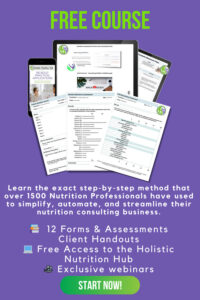As Nutritional Practitioners, we carry a great responsibility in supporting our clients by way of dietary and lifestyle guidance. Most Holistic Nutrition Practitioners are well aware of the need to work with clients on as many modalities of health as possible, in as many supportive ways and with as much well-rounded guidance as they can.
In my practice, I’ve witnessed a growing number of clients challenged beyond physical symptoms, beyond food choice, and beyond the need to modify their exercise regime, sleep, or stress levels. What I am honored to witness, at an increasing rate in my practice, are clients searching for deeper guidance, relief of ingrained habits and behaviors, permission to fall apart, and seeking a compassionate hand and heart to support them in rebuilding their RELATIONSHIP with food that is nurturing and kind. This is a relationship I have found to be fundamental in supporting all other food choices and lifestyle modifications that these clients generally already know are needed.
What is dysfunctional eating?
I like the term Dysfunctional Eating because it provides a broader spectrum than a specific or diagnosable term, such as an Eating Disorder. This term acknowledges the other thousands (perhaps hundreds of thousands) of folks out there struggling with a negative and burdening relationship with food, that would not qualify as a diagnosable ED. These many clients deserve compassionate and comprehensive support as well. It is my experience that when we unravel some of this deeper soul work, reworking these ingrained habits and behaviors, and providing a supportive environment for these clients to be able to reflect, rewire, and heal, many of the other health pieces fall into place more easily.
What Qualifies Dysfunctional Eating?
Dysfunctional Eating can look very different and vary greatly from person to person. A Dysfunctional Relationship with food can be qualified in any individual who does not feel good about food, who struggles with a negative mindset or self-talk revolving around food, and/or engages in negative food habits or behaviors. Dysfunctional Eating can range along a large spectrum from occasional or rare to daily challenges.

Common Signs of a Dysfunctional Relationship with Food
Be aware of what dysfunctional eating symptoms may pop up when you are coaching or consulting with nutrition clients
- Negative Body Image And/Or Self-Talk: While many individuals are challenged with some tendencies towards negative body image or self-talk, someone who is challenged with Dysfunctional Eating may be plagued by these negative tendencies more regularly, creating regular stress and often contributing to symptoms of anxiety and/or depression.
- Restricting and/or Over-Eating: A push-pull relationship with food is quite a telltale sign of a deeper food relationship imbalance. An individual who uses words such as bad/good foods, refers to themselves as not being strong-willed or having will-power, a long history of following diet fads, or describes moments of restriction or over-indulgence with associated regret, guilt, or shame, will often have an underlying current of Dysfunctional Eating tendencies.
- Past Trauma/Struggle with an Eating Disorder: Many individuals have a past relationship with an ED, and many have not had the opportunity or ability to fully heal. More often than not, my Dysfunctional Eating clients have deep seeded pain around their food relationship, often manifesting in feelings of guilt and shame, which take up more emotional/mental space than is healthy.
- Food Behaviours Used as Coping Strategy: Many of my clients use food for soothing, as comfort when stressed or triggered or to numb out and detach from life’s hardships. These behaviors are greatly indicative of a Dysfunctional Relationship with food and demand compassion, reflection, curiosity, and support.
5 Steps to Supporting Your Nutrition Clients with Dysfunctional Eating
Step 1: Choose food flexibility over a specific “diet”
Dysfunctional Eating clients need to have food flexibility. They are usually fearful of change and are relieved when guidance comes from a place of compassion and understanding. My approach usually involves adding in quality foods, rather than offering any suggestions around food removal. Usually, these clients need some guidance around good food rhythm, blood sugar balance, nutrient quality, and fundamental Nutrition education. Once some fundamental guidelines and offerings are in place and the client feels safe and supported, then we can introduce slow transitions away from problematic foods. My dietary motto with Dysfunctional Eating clients is SMALL STEPS.
Step 2: Focus on healthy food habits & behaviors
A good focus for Dysfunctional Eating clients is on mind-body connective habits/behaviors and Intuitive listening. I will often use Intuitive Eating Principles with these clients, encouraging slow eating, deep breaths before eating, good chewing, a calm eating environment, and giving them cues for listening to hunger and satiety signals. Dysfunctional habits and behaviors with food revolve around a disconnect between the mind and the body. Encouraging better connectivity and awareness around these practices support the development of new neural pathways, engages the parasympathetic nervous system, and promotes feelings of safety, relaxation, and joy in and around food.
Step 3: Hold Space for Their Emotions
Perhaps more important than dietary guidance, holding space for the emotions of your Dysfunctional Eating clients is paramount. These clients need to feel as though they can trust you with their hardest emotions and they need to feel heard, understood, and be given the opportunity to express freely any emotions that arise during this work. Beyond in-session discussion, I will usually offer the use of a Food Relationship Journal, offering that these clients write in their journal 2 – 3x/week and give them journal entry suggestions to support their flow and encourage deep reflection. This is absolutely not a Food Journal, where one might record all their food intake for the day, I would not recommend the use of a Food Journal with my Dysfunctional Eating or ED clients, as it can foster further obsessive behaviors. The Food Relationship Journal is a beautiful and safe place for these clients to reflect, express, and explore a new way forward with their food relationship.
Step 4: Help Them to Have a Positive Mindset
As Holistic Nutrition Practitioners, we are well aware of how powerful and empowering mindset strategies can be for clients looking to implement sustainable change. When working with Dysfunctional Eating clients, I will always challenge them to explore and evolve their mindset around Food, Food Habits/Behaviours, and how they WANT their relationship with food to look moving forward. Beyond emotional guidance, the addition of a mindset strategy can greatly impact how much progress the client achieves. Some of the mindset shifts that I offer to these clients include: Adopting a Healing Mentality, Considering Food as Nourishment, Accepting the Healing Process, Consider Forgiveness, Let Go of Blame, and Evaluating Self-Worth.
Step 5: Find Lifestyle Changes that encourage a Mind-Body Connection
Lifestyle modifications that I encourage my Dysfunctional Eating and Eating Disorder Clients towards center around passion, joy, self-love, and safety. These clients require gentle compassion and guidance towards more connection with Intuition and Self-Love above all else. I will often encourage these clients to engage with Nature regularly, to reflect on what activities, hobbies, or movement makes them feel happy, joy-filled, uplifted & positive, and to integrate those often. I steer clear from encouraging any exercise that is rigid, that might encourage obsession, or that promotes mind-body disconnect. What I am really looking for with lifestyle modifications, is to promote embodiment, mind-body connection, and encourage self-love.
In conclusion, I want to acknowledge that for the Dysfunctional Eating and Eating disorder clients, I have worked with thus far and for those that are yet to come, I am humbled by their courage. This humility has supported me in becoming a stronger practitioner, a better listener, a more passionate cheerleader, and a human of greater wisdom. I believe that every client is a gift; a gift for themselves; a gift to give to me by providing an opportunity to grow as a practitioner; a gift to society by proving time again that we can overcome almost anything.
If you would like to learn more about working with Dysfunctional Eating or Eating Disorders, there are many fantastic courses or resources to support you.
Working with Dysfunctional Eating – Resources
Practitioner Certifications:
Certified Eating Disorder Specialist – Dr. Dorie McCubbrey
The Institute for the Psychology of Eating
The Carolyn Costin Institute – Eating DIsorder Coaching
Books
Intuitive Eating – A Revolutionary Program that Works, Elyse Resch and Evelyn Tribole
8 Keys to Recovery From an Eating Disorder, Carolyn Costin
The Body Image Workbook, Thomas F. Cash
Being in Your Body: A Journal for Self-Love and Body Positivity, Fariha Róisín
Cindy is a Registered Holistic Nutritionist, Eating Psychology Counselor & Eating Disorder Recovery Coach specializing in Culinary Nutrition and currently completing her Functional Nutrition Certification. While offering online and in-person workshops & cooking classes, individual counsel, and retreats, she weaves her areas of expertise by infusing nutritional education with emotional & mental guidance and culinary passion. It is her mission to help individuals make realistic, long-term, and sustainable life changes for thriving health.



